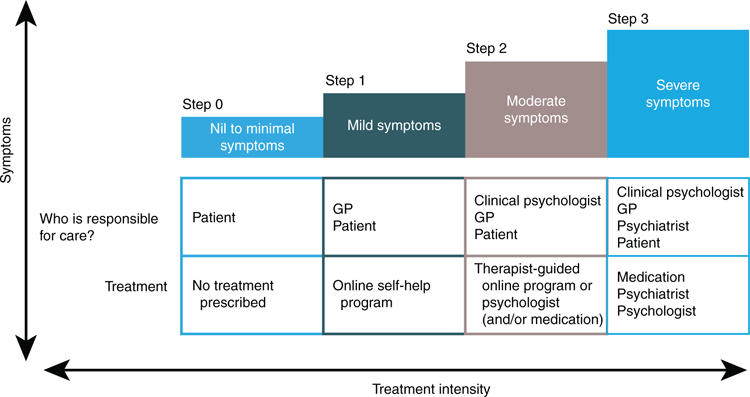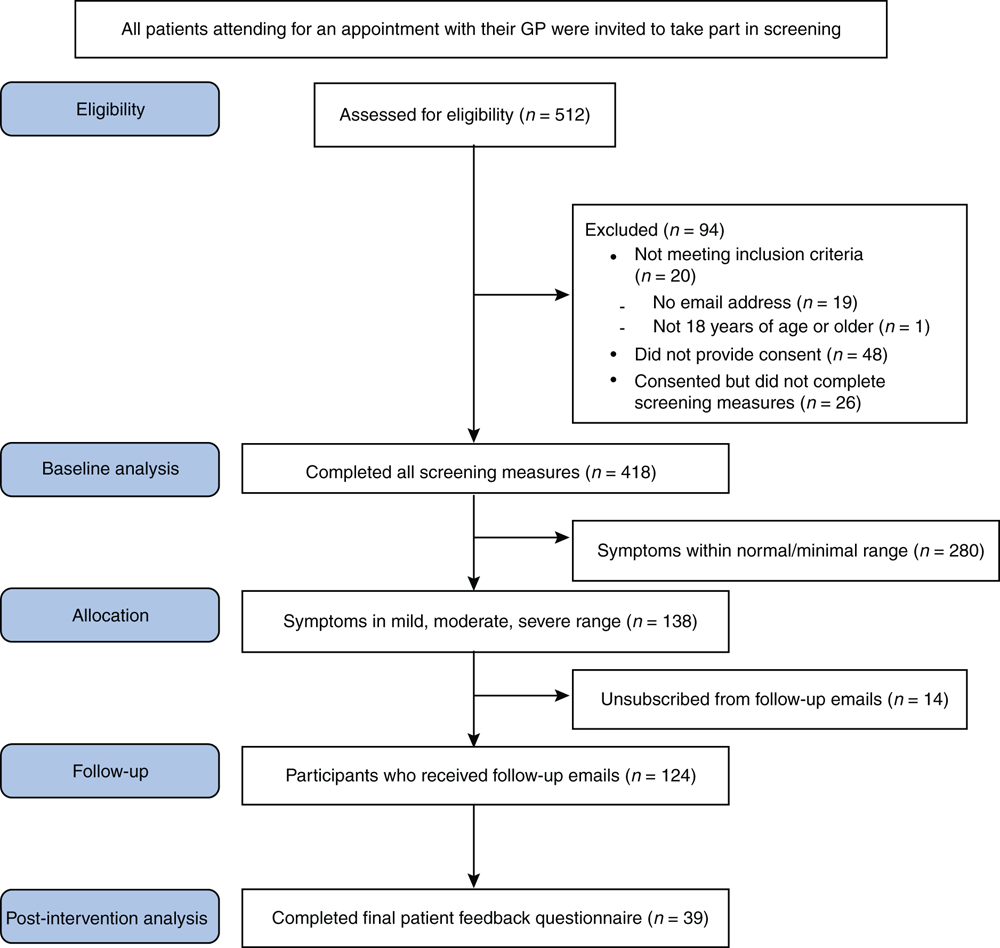Stepped care mental health service in Australian primary care: codesign and feasibility study
Josephine Anderson A C , Kathleen O’Moore A , Mariam Faraj B and Judith Proudfoot A
A
A Black Dog Institute, Hospital Road, Randwick, NSW 2031, Australia. Email: k.omoore@unsw.edu.au, judyproudfoot@ozemail.com.au
B Central and Eastern Sydney Primary Health Network, Coward Street, Mascot, NSW, Australia. Email: m.faraj@cesphn.com.au,
C Corresponding author. Email: j.anderson@blackdog.org.au
Australian Health Review 44(6) 873-879 https://doi.org/10.1071/AH19078
Submitted: 2 April 2019 Accepted: 24 June 2019 Published: 30 October 2019
Journal Compilation © AHHA 2020 Open Access CC BY-NC-ND
Abstract
Objective In 2015, the Australian Government introduced several mental health reforms, including the requirement that Primary Health Networks (PHNs) provide stepped care services for Australians with mental health needs such as anxiety and depression. This paper reports on the development and feasibility study of StepCare, an online stepped mental healthcare service in general practice that screens patients, provides immediate feedback to patients and general practitioners (GPs), transmits stepped treatment recommendations to GPs and monitors patients’ progress, including notification of deterioration.
Methods The present codesign and feasibility study in one PHN examined: (1) the acceptability and feasibility of StepCare to GPs, practice staff and patients; (2) the impact of StepCare on clinical practice; and (3) the barriers to and facilitators of implementation.
Results Thirty-two GPs, 22 practice staff and 418 patients participated in the study. Overall, patients, practice staff and GPs found StepCare acceptable and feasible, commending its privacy, the mental health screening, monitoring and feedback. They also made suggestions for service improvements. GPs reported that StepCare helped with their identification and management of patients with common mental health issues.
Conclusions Preliminary data suggest that StepCare may be acceptable and feasible in Australian general practice, helping GPs identify and manage common mental health problems in their patients. The study provides implications for policy and practice, and points the way to future translational research into stepped mental health care.
What is known about the topic? Depression and anxiety are common illnesses in primary care and GPs are ideally placed to implement stepped care approaches enabling early detection and accessible, effective care.
What does this paper add? Developed in and for general practice, StepCare is the first fully integrated stepped approach to primary mental health care in Australia. As a first step in a translational research program evaluating the effectiveness of StepCare, this paper reports data regarding the feasibility and acceptability of the service.
What are the implications for practitioners? Integrated into the workflow of general practice, StepCare is an online service that helps GPs detect new cases of depression and anxiety, provide evidence-based stepped care treatments and monitor patients’ progress.
Additional keywords: general practice.
Introduction
In Australia, 12.4% of all general practice encounters are mental health related, with depression, anxiety and sleep disturbance accounting for 60.8% of mental health problems managed.1 Primary Health Networks (PHNs) support general practices and work with other parts of the primary healthcare system, as well as secondary and tertiary healthcare services, to increase the efficiency and effectiveness of medical services and improve coordination of care. In 2015, the Australian Government Department of Health introduced several mental health reforms, including the requirement that PHNs provide stepped care services for Australians with mental health needs. Stepped care is a model of health care delivery that provides the least intensive intervention appropriate to patient need and, with regular monitoring, more or less intensive treatments according to treatment response.2 International evidence supports the effectiveness of stepped mental health care models.3–5 However, at the time of the Australian Government policy initiative, stepped mental health care had yet to be implemented in primary care.
The most common form of management for mental health-related problems used in general practice at that time was the prescription, supply or recommendation of medications: 61.6 per 100 mental health-related problems managed.1 An additional government policy priority was to increase the breadth of evidence-based mental health treatments available in primary care and, in particular, to increase the appropriate referral to low-intensity services, including eMental Health programs, for patients with mild to moderate depression and anxiety.
In response to these government reforms, we developed an online stepped mental healthcare service for general practice, StepCare, designed to be accessed through and with the support of PHNs. Integrated into the day-to-day workflow of general practice, StepCare focuses on the early detection of and evidence-based intervention for patients with depression and/or anxiety.
Here we report on the codesign, development and implementation of StepCare, as well as the results of a pragmatic study examining its acceptability and feasibility within a sample of Australian general practices.
Methods
Development and implementation of StepCare
In collaboration with a large PHN, we set up a codesign process and conducted iterative workshops and consultations with PHN management, clinical and information technology (IT) staff. Input was also gained from an organisation providing a secure messaging service to general practices, a lived experience consultation group and a general practitioner (GP) consultation group. A StepCare Advisory Group was established to provide ongoing clinical governance and technical oversight. Our aim was to create an evidence-based service that integrated smoothly into general practice workflow. Along with real-world experience, we used implementation theory, specifically normalisation process theory (NPT), which identifies factors that promote and inhibit the integration of complex interventions into routine practice.6,7 Subsequent to development completion in 2016, StepCare was implemented in general practices supported by a single PHN (Central and Eastern Sydney PHN). One of the authors (KO’M) trained GPs and their practice staff in StepCare, contacting practices weekly to answer questions and facilitate implementation. All authors met at a monthly steering committee with key stakeholders.
Consisting of three main functions, StepCare is an online system integrated into the day-to-day work of general practice that: (1) identifies patients with anxiety and depression; (2) recommends appropriate interventions; and (3) monitors symptoms and treatment adherence, providing feedback to both patient and GP.
Patients attending a GP consultation for any reason are invited to complete a 5-min screening on a mobile tablet in the waiting room. Mild, moderate and severe anxiety or depression are identified using the Patient Health Questionnaire-9 (PHQ-9)8 and Generalised Anxiety Disorder-7 (GAD-7).9 Suicidal ideation and social factors commonly associated with distress are also measured. The tablet provides immediate feedback to patients. Screening results and StepCare treatment recommendations are sent in real time to the GP’s software via a secure messaging service. All StepCare-recommended treatments are evidenced based and stepped according to symptom severity and need (see Fig. 1). The StepCare screening results also include sample verbal scripts for GPs to help with the patient’s further assessment and treatment planning.
Patients reporting mild, moderate or severe symptoms at screening are asked to complete fortnightly online monitoring for 8 weeks using the PHQ-9 and GAD-7. Immediate feedback is sent online to patients and GPs to inform review and stepping up in treatment intensity if required. In cases of emerging or increased suicidality or deterioration in mental state during this monitoring period, GPs and patients receive feedback suggesting review, with crisis contact details. GPs can also refer patients to Black Dog Institute clinics or telepsychiatry.
GPs maintain clinical responsibility for their patient throughout StepCare. At assessment, they add their knowledge of the patient to the information provided by StepCare to inform treatment recommendations and, at review, GPs use StepCare together with their clinical expertise to step up, step down or maintain treatment intensity, as indicated.
Feasibility study
This study addressed the following research questions:
-
Is StepCare acceptable to, and feasible for, GPs, practice staff and patients?
-
Does StepCare assist GPs with the identification and management of their patients, and is it associated with changes in clinical practice?
-
Are there any barriers or facilitators to implementing StepCare in general practice?
This feasibility study was part of a larger translational research program evaluating the StepCare service.
A mixed-methods design was used incorporating both a quantitative survey questionnaire and qualitative open questions to conduct the pragmatic feasibility study.
The study was approved by the University of New South Wales Human Research Ethics Committee (HREC 15827).
Sample and recruitment
A large urban PHN invited expressions of interest from general practices. All GPs and practice staff (practice managers and receptionists) in participating practices were invited to take part. Five general practices across diverse socioeconomic settings within the participating PHN took part in the feasibility study. These practices ranged in size from a small, part-time solo-GP practice to a large busy medical practice with 15 participating GPs. Within the five practices, 32 GPs, 22 practice staff and 464 patients consented to participate. Those GPs and practice staff who consented were given a 30-min training workshop in their practice by a StepCare team member, followed by ongoing support after the service was launched.
Adult patients attending a GP consultation, regardless of presenting problem, were invited by the practice receptionist to complete the screening questions on a mobile tablet in the waiting room. Eligible patients (Table 1) who provided online consent could complete the screening while waiting for their appointment.
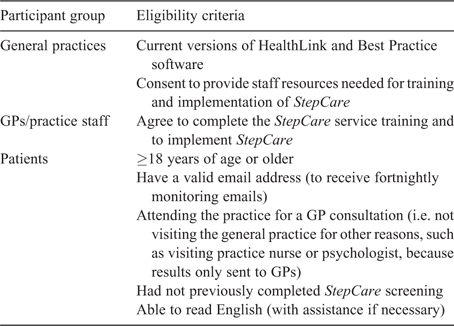
|
Outcome measures
StepCare service evaluation
Three service evaluation questionnaires, one each for GPs, practice staff and patients participating in StepCare, were developed from NPT and previous service evaluations. Views about various aspects of StepCare were sought from participants, but the study did not intend individual components to create specific outcomes. Rather, the surveys investigated the overall perceived acceptability, helpfulness and effectiveness of StepCare.
GPs and practice staff were asked further questions regarding facilitators and barriers to implementing the service, including the practice’s readiness to implement StepCare.
GPs and practice staff completed the survey at the end of the 3-month intervention period. Patients reporting symptoms in the mild to severe range at screening completed the survey at the end of the 8-week monitoring period.
Clinical practice
GPs were asked about the utility of StepCare for the identification and management of their patients’ mental health. GPs were also asked to provide feedback about StepCare treatment recommendations, whether they adopted the recommendations for each patient and, if not, what treatment(s) they recommended and the reason. Referrals to low-intensity services (in StepCare, an online self-help program, namely myCompass;10 www.mycompass.org.au, accessed 30 September 2019) was of particular interest, due to the Australian Government mental health priority of increasing appropriate referral to low-intensity services.
Data analysis
All quantitative analyses were conducted using SPSS version 22 (IBM Corp., Armonk, NY, USA). Descriptive statistics were used to explore participants’ characteristics, StepCare evaluation feedback from GPs, practice staff and patients and GPs’ clinical practice. A qualitative analysis of self-report free-text responses was undertaken to identify barriers and facilitators to service implementation. Salient themes and principles were identified using thematic analysis, a method for identifying, analysing and reporting patterns of meaning within data.11 Recommendations for next steps of service development were also identified.
Results
Demographic data were received from 22 GPs and 15 practice staff. Most GPs were aged between 26 and 40 years (54.4%), female (68.2%) and employed full-time (63.6%). Just over half the GPs reported a special interest in mental health (54.5%), and 77.3% reported having received education and training in mental health. Practice staff were predominantly female (93.3%), employed part-time (53.3%), with 40% aged between 41 and 64 years, 46.7% having no special interest in mental health and 60% with no training in mental health. In all, 418 patients met eligibility criteria and completed the screening questionnaires. Of these, 280 (67%) reported nil to minimal symptoms of depression and/or anxiety on the PHQ-9 and GAD-7, 46 (11%) reported symptoms in the mild range, 51 (12%) reported moderate-level symptoms and 41 (10%) reported severe symptoms. Symptomatic patients were followed-up fortnightly. Patient flow through the study is shown in Fig. 2.
StepCare service evaluation
StepCare evaluation questionnaires were completed by 22 GPs (69%), 15 practice staff (83%) and 39 patients (28% of the 138 who reported symptoms).
GPs’ ratings and feedback
Most GPs reported that StepCare fitted well with their beliefs and philosophies about general practice and was congruent with their practice’s existing structure and processes. Regarding individual features of StepCare, most GPs liked the mental health screening and feedback, treatment recommendations, hyperlinks to services, suicidality assessment information and frequency and duration of fortnightly monitoring with GP alerts. Conversely, only 45.5% liked the verbal scripts for GPs (the remainder being neutral) and 63.7% reported they did not login to check patients’ fortnightly symptom scores. Similarly, only 31.8% of GPs found that StepCare integrated easily into practice flow, with 22.7% responding ‘difficult’ and 45.5% ‘neutral’ to this question. Despite this, 68% of GPs indicated they would support the future use of StepCare in their practice.
Practice staff ratings and feedback
Most practice staff agreed that StepCare worked well for people with worries or low mood, and 68.1% indicated a need for the service. Like GPs, most staff reported that StepCare was congruent with the practice’s existing structure and processes, although only 53.4% (vs 72.7% of GPs) reported that StepCare fitted with their beliefs and philosophies. Despite this, 81% of staff reported that they would support the future use of StepCare in their practice.
Patients’ ratings and feedback
Most patients rated the individual components of StepCare ‘acceptable’, including the mental health screening (66.7%), screening feedback (69.2%), GP feedback (59.5%), fortnightly assessment (74.4%) and fortnightly feedback (68.4%). Although patients were less confident than GPs that the service worked well for people with worries or low mood, most still agreed with the statement and 64.8% indicated they would recommend StepCare to a friend.
Overall, GPs, practice staff and patients found StepCare to be acceptable in general practice, that it worked for people with worries or low mood (feasibility) and they would support and recommend its use (Fig. 3). Feedback from each group about the barriers and facilitators to implementing StepCare, as well as suggested improvements to the service, are summarised in Table 2.
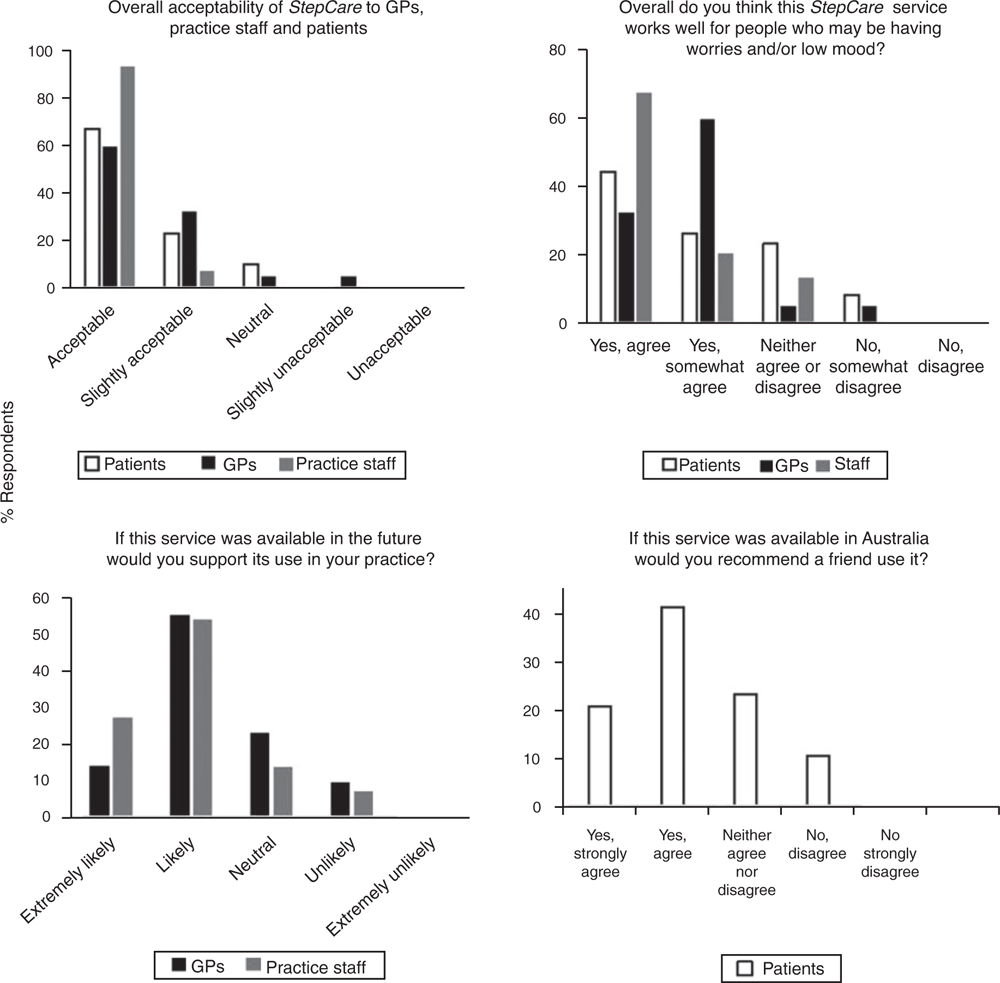
|
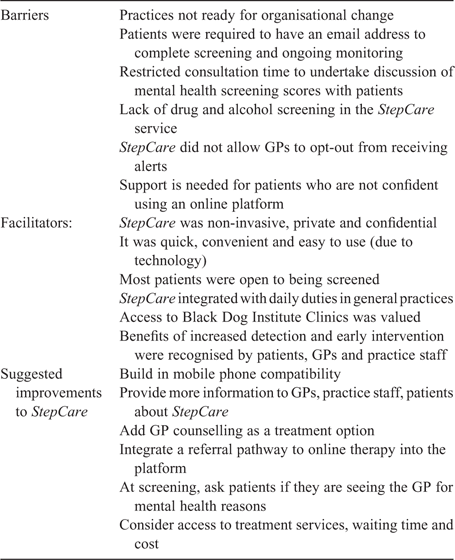
|
Clinical practice
Predominantly, GPs indicated that StepCare assisted with their identification and management of people with anxiety and depression (Fig. 4). However, in answer to whether StepCare changed their usual practice, 22.7% responded ‘moderately’, 50% ‘slightly’ and 27.3% ‘not at all’. GPs provided information about the treatment(s) they prescribed for 69% (n = 95) of their patients who screened with anxiety and/or depressive symptoms. They also rated the degree of alignment of their prescribed treatment(s) for individual patients with the StepCare recommendation (see Table 3). The main reason given by GPs who selected ‘not at all’ to the question ‘Did you adopt the StepCare recommendation?’ was ‘Patient already undergoing mental health treatment’. Other reasons included patient preferences, comorbidity, a patient’s motivation to engage with any or specific treatment options and patient former experiences. Only two GPs felt the StepCare recommendation was inappropriate for a particular patient.
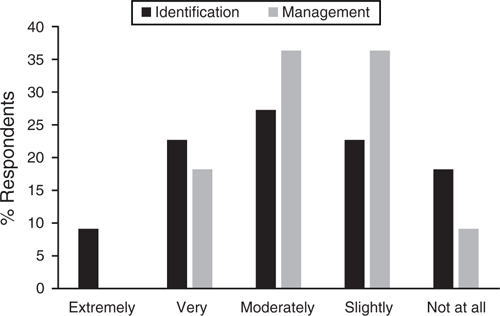
|
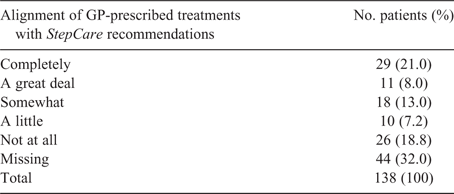
|
GPs referred nine patients (19.5%) who screened with mild anxiety and/or depression symptoms (n = 46) to the online self-help program myCompass, either alone or in conjunction with another treatment. Of patients who scored in the moderate symptom range at screening (n = 51), most (56.9%; n = 29) were referred to a psychologist and/or were prescribed an antidepressant medication. For patients in the severe range (n = 41), GPs prescribed antidepressant medication for 61% (n = 25) and referred these patients to a psychologist and/or a psychiatrist as recommended by StepCare. Three patients with moderate or severe symptoms were referred to the myCompass program.
Discussion
The results of this translational ‘real-world’ study suggest that StepCare is potentially acceptable and feasible within the day-to-day work of general practices, helping GPs identify and manage their patients’ anxiety and depression. Screening results were in line with national population-wide mental health,12 indicating that the service was appropriately implemented as a practice-wide screener, rather than selectively targeting certain patients. Ratings by GPs, practice staff and patients about the acceptability, feasibility and ‘fit’ of StepCare were generally positive. Free-text feedback about service facilitators, such as ease of use, low cost and GPs, practice staff and patients feeling supported, endorsed many of the design features of StepCare. Diverse feedback from the three groups about barriers provided clear points for future enhancements, and, indeed, several enhancements, such as integrated referral to online therapy, alcohol use screening and localised referral pathways, have been made to StepCare based on these study findings.
Most responding GPs provided treatments in line with StepCare recommendations for patients in the moderate to severe range. However, their referral of only 19.5% of mildly symptomatic patients to the self-help online treatment program was low. Increasing access to low-intensity services such as the one used in StepCare is an Australian Government reform priority. Government-funded GP training initiatives have made positive inroads in enhancing GPs’ awareness of and confidence in using online programs, but our data suggest this is yet to fully transfer into treatment prescription.
Limitations
This study has several limitations, including some of the common weaknesses of translational research. The pragmatic recruitment process, small sample size, variety and complexity of general practices and low survey completion rates restrict generalisations that can be drawn from the data. In addition, GPs in the sample had higher-than-average interest and training in mental health, which introduces bias into the findings.
However, the results may provide some interesting considerations in terms of NPT, a sociological model applicable to the implementation of change in complex, real-world health settings.6,13 The theory proposes four main factors that enable an intervention to become ‘normalised’ into routine practice: coherence, cognitive participation, collective action and reflexive monitoring.7 The results of this pragmatic study suggest that, in general, StepCare made sense to the participating GPs, practice staff and patients (coherence), they engaged with it, as demonstrated by the fact that they willingly undertook the training, they followed StepCare procedures (cognitive participation) and they found ways to enable StepCare to be part of their workflow (collective action). However, only some of the GPs, practice staff and patients completed the surveys appraising the benefits and limitations of the StepCare (reflexive monitoring). This is an area requiring further attention. The model of service training and support may also require adjustment. Although effective, it is resource intensive in its current form, limiting potential scaling up of StepCare. This requires further research. Additional research is also underway to evaluate the outcomes and cost-effectiveness of the StepCare service.
Conclusion
To the best of our knowledge, this is the first implementation and feasibility evaluation of an integrated stepped care service for anxiety and depression in general practice. Preliminary data suggest that StepCare is acceptable, feasible and helps GPs identify and manage common mental health problems.
Competing interests
The authors declare no conflicts of interest.
Acknowledgements
The authors gratefully acknowledge the collaboration of IT and clinical staff of Central and Eastern Sydney Primary Health Network in the codesign and evaluation of the service, as well as the participation of GPs, staff and patients. This research was not funded by a specific grant.
References
[1] Australian Institute of Health and Welfare (AIHW). Mental health services in Australia in brief 2018. Canberra: AIHW 2018. Available at: https://www.aihw.gov.au/reports/mental-health-services/mental-health-services-in-australia-in-brief-2018/contents/table-of-contents [verified 3 October 2019].[2] Bower P, Gilbody S. Stepped care in psychological therapies: access, effectiveness and efficiency: narrative literature review. Br J Psychiatry 2005; 186 11–7.
| Stepped care in psychological therapies: access, effectiveness and efficiency: narrative literature review.Crossref | GoogleScholarGoogle Scholar | 15630118PubMed |
[3] Clark DM. Implementing NICE guidelines for the psychological treatment of depression and anxiety disorders: the IAPT experience. Int Rev Psychiatry 2011; 23 318–27.
| Implementing NICE guidelines for the psychological treatment of depression and anxiety disorders: the IAPT experience.Crossref | GoogleScholarGoogle Scholar | 22026487PubMed |
[4] van Straten A, Geraedts A, Verdonck-de Leeuw I, Andersson G, Cuijpers P. Psychological treatment of depressive symptoms in patients with medical disorders: a meta-analysis. J Psychosom Res 2010; 69 23–32.
| Psychological treatment of depressive symptoms in patients with medical disorders: a meta-analysis.Crossref | GoogleScholarGoogle Scholar | 20630260PubMed |
[5] van’t Veer-Tazelaar PJ, van Marwijk HWJ, van Oppen P, van Hout HPJ, van der Horst HE, Cuijpers P, Smit F, Beekman AT. Stepped-care prevention of anxiety and depression in late life: a randomized controlled trial. Arch Gen Psychiatry 2009; 66 297–304.
| Stepped-care prevention of anxiety and depression in late life: a randomized controlled trial.Crossref | GoogleScholarGoogle Scholar | 19255379PubMed |
[6] May CR, Mair F, Finch T, MacFarlane A, Dowrick C, Treweek S, Rapley T, Ballini L, Ong BN, Rogers A, Murray E, Elwyn G, Légaré F, Gunn J, Montori VM. Development of a theory of implementation and integration: normalization process theory. Implement Sci 2009; 4 29
| Development of a theory of implementation and integration: normalization process theory.Crossref | GoogleScholarGoogle Scholar | 19460163PubMed |
[7] Murray E, Treweek S, Pope C, MacFarlane A, Ballini L, Dowrick C, Finch T, Kennedy A, Mair F, O’Donnell C, Ong BN, Rapley T, Rogers A, May C. Normalisation process theory: a framework for developing, evaluating and implementing complex interventions. BMC Med 2010; 8 63
| Normalisation process theory: a framework for developing, evaluating and implementing complex interventions.Crossref | GoogleScholarGoogle Scholar | 20961442PubMed |
[8] Kroenke K, Spitzer RL, Williams JBW. The PHQ-9. J Gen Intern Med 2001; 16 606–13.
| The PHQ-9.Crossref | GoogleScholarGoogle Scholar | 11556941PubMed |
[9] Spitzer RL, Kroenke K, Williams JW, Löwe B. A brief measure for assessing generalized anxiety disorder: the GAD-7. Arch Intern Med 2006; 166 1092–7.
| A brief measure for assessing generalized anxiety disorder: the GAD-7.Crossref | GoogleScholarGoogle Scholar | 16717171PubMed |
[10] Proudfoot J, Clarke J, Birch M-R, Whitton AE, Parker G, Manicavasagar V, Harrison V, Christensen H, Hadzi-Pavlovic D. Impact of a mobile phone and web program on symptom and functional outcomes for people with mild-to-moderate depression, anxiety and stress: a randomised controlled trial. BMC Psychiatry 2013; 13 312
| Impact of a mobile phone and web program on symptom and functional outcomes for people with mild-to-moderate depression, anxiety and stress: a randomised controlled trial.Crossref | GoogleScholarGoogle Scholar | 24237617PubMed |
[11] Braun V, Clarke V. Using thematic analysis in psychology. Qual Res Psychol 2006; 3 77–101.
| Using thematic analysis in psychology.Crossref | GoogleScholarGoogle Scholar |
[12] Australian Psychological Society. One-third of Australia stressed out. [Media release] 2015. Available at: https://www.psychology.org.au/news/media_releases/8Nov2015-pw [verified 24 September 2019].
[13] Robert G, Greenhalgh T, MacFarlane F, Peacock R. Adopting and assimilating new non-pharmaceutical technologies into health care: a systematic review. Journal of Health Services Research & Policy 2010; 15 243–50.
| Adopting and assimilating new non-pharmaceutical technologies into health care: a systematic review.Crossref | GoogleScholarGoogle Scholar |


